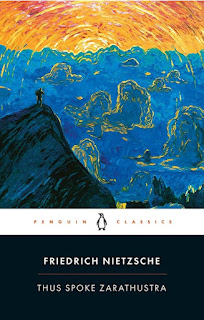Tryst With The Overman: Book Review (Thus Spake Zarathustra)
“I will show them the rainbow and the stairway to the Overman!”
-Zarathustra, Thus Spoke Zarathustra.
(Previously published in a now defunct website. Some changes have been made to the original article.)
Thus spake Zarathustra to the congregation of saintly men in the town of the Motley Cow, a clever euphemism that Nietzsche uses to eschew severe austerity and stoicism.
Thus Spoke Zarathustra is considered to be the magnum opus of Friedrich Nietzsche’s philosophical works. Written and published in four phases between 1883 and 1885, although this piece, akin to many of Nietzsche’s literature, did not bring fame and fortunes to the philosopher, in the early 20th century, it was recognized as a marvellous and ground-breaking treatise on existentialist philosophy. It stimulates the process of the dismemberment of concretely established metaphysics(which culminates in Beyond Good and Evil, whereby Nietzsche criticizes philosophies and schools of thought individually) and virulently attacks virtue and restraint, practices which Nietzsche believes stigmatize and stifle the noblest order of men and conform a rapidly evolving consciousness.
This work introduces and elucidates the Nietzschean theory of Overman(Ubermensch), a new species of men that transcends conventional morality and creates its own destiny independent of external factors.
Nietzsche cleverly uses the historical figure Zoroaster and concorts a hitherto unknown persona out of him, plausibly an allusion to his firm belief in transvaluation or metamorphosis.
The story begins with Zarathustra being blessed with enlightenment and moved to sermonize the epiphany that has just dawned upon him. He encounters a congregation of wise men in the town of the Motley Cow, and impresses upon them the peremptory need to reconsider their teachings and doctrines. Imprimis, he talks of the metamorphoses that lead to the transformation of humans into Overmen-- the camel(symbolizing the renouncement of one’s comforts,the exercise of self-discipline and the tenacious opposition to all pains that life has to offer), the lion( symbolizing the assertion of one’s independence and sovereignty), and the child(which symbolizes the act of creation).
The consequent chapters harp upon subtle criticisms of austerity and denial of life’s pleasures( referred to as sleep), herd mentality(crudely alluded to by the example of authors deliberating toning down their writing for the sake of the masses), and mind-matter duality. It must be noted that Nietzsche wasn’t an admirer of metaphysics, firmly believing in empiricism and scientific reasoning. In this regard, he completely rejects ontological theses, claiming them to be “delusionary” and “absolutely irrelevant”. Of course! He does so in his trademark polemics and one-liners.
Through the analogy of a young man lamenting his ostracization on a mountainside, Nietzsche brings out the frustration and alienation of the Modern Man in an increasingly collectivistic and conforming society--one that denies the existence of the individual. Here we see Zoroaster placating the frustrated youth and even commending him for having asserted his independence and uniqueness.
The closing chapters criticize all those who preach one to lead life as it were characteristically beset with suffering and to suffer for the sake of experiencing joy in an afterlife. Zoroaster believed that they profess the abnegation of pleasures and ultimately life itself. Thus, he concludes, and very aptly so, that they are the Preachers of Death.
Thus we see that this work is bathed in Nietzsche’s virulent affirmation of life and amor fati, i.e, love of one’s fate. On a lighter note, this book is also bathed in his prosaic, verbose and at times impenetrable writing, something which has led to widespread misinterpretation, especially during the Interwar Period whereby the Fascists manipulated his writings into justifying their racial and nationalist policies. This is quite ironic as Nietzsche himself was an internationalist and throughout his life derided anti-Semites, going as far as severing all ties with his sister.
In conclusion, this is a must read for all students of philosophy, history and Western literature.




Comments
Post a Comment